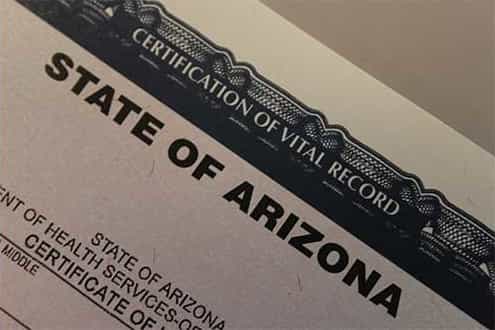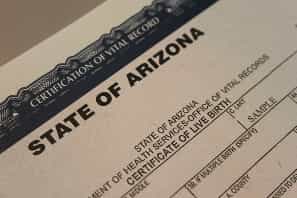
 The birth of a child is a miracle event that often brings families together. However, when a child is conceived, there are some situations where the child’s paternity can be questioned. Arizona birth certificate laws help determine how to establish paternity in Arizona (determining the biological father of the child) and keep your parental rights intact when child support, custody, and other legal decisions are made during an Arizona divorce. Birth certificates are also typically needed to apply for things like life insurance, a Social Security card/benefits, certain licenses, legal forms/documents, various government programs, and much more. Having the original birth certificate is also required in many cases. But what are the rules surrounding birth certificates in AZ?
The birth of a child is a miracle event that often brings families together. However, when a child is conceived, there are some situations where the child’s paternity can be questioned. Arizona birth certificate laws help determine how to establish paternity in Arizona (determining the biological father of the child) and keep your parental rights intact when child support, custody, and other legal decisions are made during an Arizona divorce. Birth certificates are also typically needed to apply for things like life insurance, a Social Security card/benefits, certain licenses, legal forms/documents, various government programs, and much more. Having the original birth certificate is also required in many cases. But what are the rules surrounding birth certificates in AZ?
Arizona Revised Statute § 36-334 – Determining maternity and paternity for birth certificates
- A person completing a birth certificate shall state the name of the woman who gave birth to the child on the birth certificate as the child’s mother unless otherwise provided by law or court order.
- The state registrar shall not refuse to register a birth certificate because the birth certificate does not include the name of the father.
- If a father’s name is stated on a birth certificate, the father’s name shall be stated on a birth certificate as follows:
- Except as provided in section 25-814, if the mother is married at the time of birth or was married at any time in the ten months before the birth, the name of the mother’s husband.
- If a mother and father who are not married to each other at the time of birth and were not married to each other in the ten months before the birth voluntarily acknowledge paternity pursuant to section 25-812, the name of the father acknowledging paternity.
- If the state registrar receives an administrative order or a court order establishing paternity, the father’s name in the order.
- If the acknowledgment of paternity is rescinded pursuant to section 25-812, the state registrar shall remove the father’s name from the registered birth certificate.
(This quotation of A.R.S. § 36-334 is from this source.)
Breaking Down Arizona Birth Certificate Laws
 In Arizona, an unwed mother is automatically granted full parental rights to the child. First, however, an unwed father must establish parental rights.
In Arizona, an unwed mother is automatically granted full parental rights to the child. First, however, an unwed father must establish parental rights.
Even in cases when the unwed father has signed the birth certificate, he needs to ensure that he has parental rights to be able to take part in any legal decision-making for the child.
This law means that until parental rights are established for the father, the mother has the final say in any decisions regarding the child. Learn more about fathers’ rights in Arizona.
What are Some Examples of Parental Rights in Arizona?
Here are some examples of decisions that require the person to have parental rights to make:
- Health care decisions: such as determining the proper treatment of conditions, circumcision in cases of newborn boys, vaccinations, medications, and decisions on other health care issues
- Custody: not having parental rights means that a person is unable to see their child when they want if the parent with parental rights disagrees
- Schooling: any decisions regarding the education of the child
It all boils down to the parent with parental rights being able to make all of the decisions regarding the child until they come of legal age and then can make their own decisions.
Paternity Presumption in Arizona
Under Arizona birth certificate laws, there are a few ways that a man may be presumed the father. These include:
- A match of 95% or more on a genetic test affirms the man’s paternity.
- Being married to the mother ten months before the child’s birth or that the child was born in a time frame of ten months after the end of the marriage through a separation, annulment, divorce, or death. Basically, this statement means that the parents were legally wed at or around the time of conception of the child.
- Both the unmarried mother and unmarried presumptive father sign a voluntary acknowledgment of paternity.
- Both the unmarried mother and unmarried presumptive father sign the birth certificate.
In any of these cases, clear evidence that the man should not be considered the presumptive father could challenge his presumptive paternity. A court degree could also establish another man’s paternity and would dispute the presumptive paternity.
How to Establish Paternity in Arizona
It’s often advisable for an unwed father to go through the different steps to ensure that they establish paternity in Arizona. In some cases, it may not be enough to have the father sign the birth certificate, especially if there are disagreements regarding the relationship and decisions regarding the child. One of the first steps an unwed father should take is to gain a DNA genetic test that asserts they are the father on the report. It can also be advisable for both parties to sign a voluntary acknowledgment of paternity that’s witnessed and notarized. When there are issues in establishing paternity, it’s often advisable to speak with a family law attorney to learn more about Arizona birth certificate laws and your rights regarding establishing paternity through legal methods.
Default Judgements of Paternity in Arizona
One thing to keep in mind with Arizona birth certificate laws and paternity lawsuits is default judgments. For example, when the mother has petitioned the court to establish paternity, but the father ignores the petition, the judge can enter a default paternity judgment. When this happens, they can order the father to pay child support. In addition, if the judge orders a DNA test, but the suspected father doesn’t take the test, the judge can enter a default judgment of paternity and order the father to pay child support.
Timeline of Establishing Paternity
The timeline of establishing paternity in Arizona is somewhat flexible depending on the needs of the circumstances. For example, paternity can be established through a petition to the court while the mother is pregnant or after the baby arrives. In cases when paternity is used to establish child support or past child support, the paternity must be filed before the child turns 18. However, if the child requires paternity to be established to be named an heir to the parent, this can be done after they have turned 18 with the proper evidence.
Conclusion
Understanding the requirements for Arizona birth certificate laws can be complicated, especially when considering a scenario that’s not traditional surrounding your child’s birth. However, an experienced family law attorney can help you ensure your parental rights are protected, regardless of birth records. Our divorce attorneys in Arizona can help.
Learn more about Arizona birth certificate laws when you contact us today.